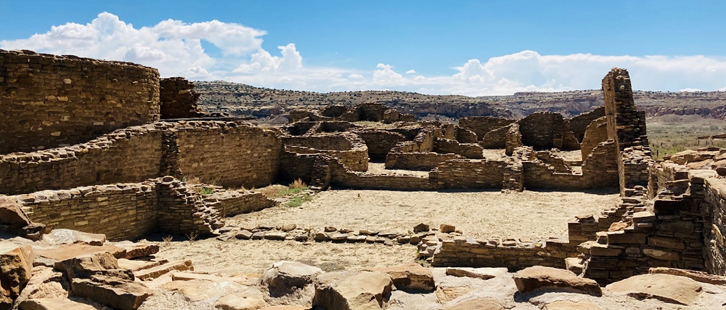
- Details
- By Native News Online Staff
New Mexico’s public lands commissioner, Stephanie Garcia Richard, announced a 20-year extension of the state’s ban on new oil, gas, and mineral leasing around the Greater Chaco region.
The extension continues decades of tribal efforts, along with efforts from elected officials, that sought to ensure the protection of 72,776 acres of state land that has cultural significance to the New Mexico Pueblos and area Tribes.
The surrounding desert landscape of Chaco Canyon contains rich archaeological resources and Pueblo and other Tribal nation’s cultural sites, which are still utilized today. Structures in the Chacoan landscape date back approximately 850 to 1250 years to when the area was home to a social and religious center for the Chacoan people.
“The Pueblos are living cultures,” said Mark Mitchell, Chairman of the All Pueblo Council of Governors and former Governor of Tesuque Pueblo, in a press release. “We rely on the land and her ecosystems to sustain our traditions. In particular, Chaco Canyon has been subject to unfettered oil and gas development for decades. The permanent protection is not only for us, but for those who have yet to be born so they may continue to know that our roots, our cultures, our languages are tied to this sacred and irreplaceable area.”
 Make A Donation Here
Make A Donation Here
The executive order follows a tribal summit in Washington last week where officials vowed to continue consultation efforts to ensure Native American leaders have more of a seat at the table when land management decisions affect culturally significant areas. New guidance for federal agencies were also recently published to help with the effort.
“The Greater Chaco landscape is one of the most special places in the world, and it would be foolish not to do everything in our power to protect it,” said Commissioner Garcia
Richard in a press release. “This region is significant for our Indigenous communities and the cultural properties found in the area are irreplaceable. Action at both the federal and state level is necessary to ensure we are protecting these special resources.”
In 2022, Richard also implemented the agency’s Cultural Properties Protection Rule, which requires cultural property surveys to be conducted before ground disturbance can occur on state lands. Analysis by the Cultural Resources Office within the State Land Office suggests more than 80 percent of state lands in the Greater Chaco Region have still not been surveyed for cultural properties.
More Stories Like This
Gwich'in Tribal Governments Submit Comments Challenging Fish and Wildlife Service's Inadequate Environmental Review of Arctic Refuge Snow RoadRappahannock Tribe Challenges 9M-Gallon Water Plan
Feds release draft long-term plans for Colorado River management
Apache Leader Walks 60 Miles to Court Hearing That Will Decide Fate of Sacred Oak Flat
Rappahannock Tribe Raises Sovereignty and Environmental Concerns Over Caroline County Water Permit
Help us defend tribal sovereignty.
At Native News Online, our mission is rooted in telling the stories that strengthen sovereignty and uplift Indigenous voices — not just at year’s end, but every single day.
Because of your generosity last year, we were able to keep our reporters on the ground in tribal communities, at national gatherings and in the halls of Congress — covering the issues that matter most to Indian Country: sovereignty, culture, education, health and economic opportunity.
That support sustained us through a tough year in 2025. Now, as we look to the year ahead, we need your help right now to ensure warrior journalism remains strong — reporting that defends tribal sovereignty, amplifies Native truth, and holds power accountable.
 The stakes couldn't be higher. Your support keeps Native voices heard, Native stories told and Native sovereignty defended.
The stakes couldn't be higher. Your support keeps Native voices heard, Native stories told and Native sovereignty defended.
Stand with Warrior Journalism today.
Levi Rickert (Potawatomi), Editor & Publisher

